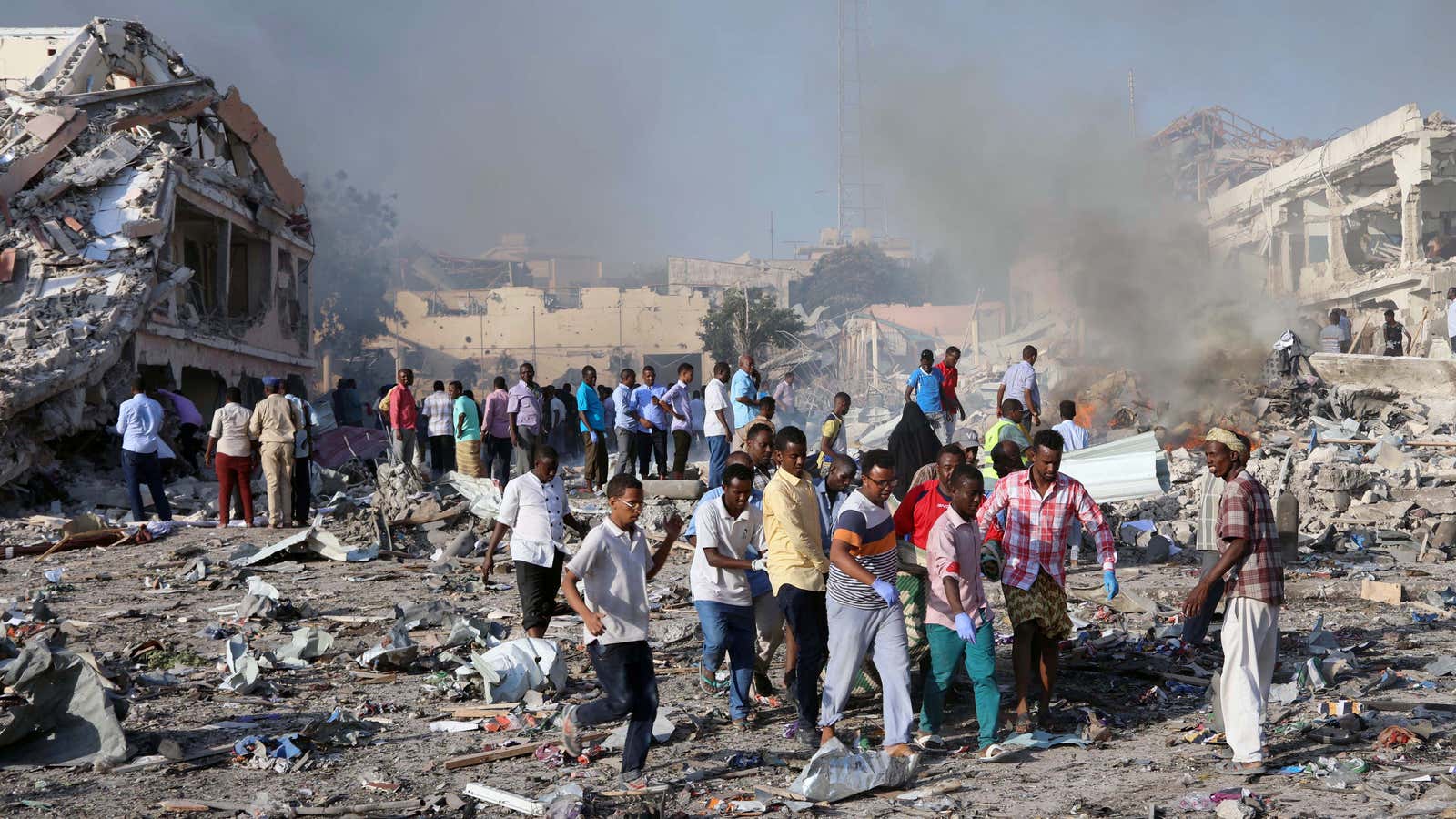Over 300 people were killed and hundreds injured when a truck exploded on Saturday (Oct. 14) at a busy intersection in the Somali capital Mogadishu.
The bombing, the single deadliest attack in Somalia’s history, shook the nation and reverberated around the world. Collapsed buildings, burned out cars, and body parts lay strewn at the K5 junction, while a huge plume of smoke rose. Journalists, doctors, humanitarian workers, a Somali father of three from Bloomington, Minnesota, and even a doctor who was due to graduate this week, are among those killed when the bomb was detonated.
And though the exact target of the attack remains unclear and no one has taken responsibility, the blast “severely damaged” the Qatari diplomatic mission in Mogadishu and a hotel frequented by government officials and diaspora visitors. The Horn of Africa nation is currently facing a “national disaster,” with president Mohamed Abdullahi Farmaajo announcing three days of mourning and ordering flags to fly at half mast.
Yet, amid the chaos, the country’s nascent tech sector has stepped in to help in the relief efforts. Young Somalis, both in and out of the country, have been using social media sites to track and identify dead or missing people, share the names and locations of those injured, appeal for global attention, and seek financial support. These grassroots, tech-based initiatives have come in handy in a country still reeling from the effects of over a two-decade war.
“Technology can help save lives, especially in a country like Somalia,” says Stockholm-based Abdi Addow, who established a 100,000 Swedish krona ($12,300) GoFundMe campaign on behalf of Aamin Ambulance, a fleet of secondhand ambulances considered Somalia’s only free ambulance service. Addow previously co-founded Caawi Walaal (“help a brother or sister” in Somali) and Abaaraha (“drought” in Somali), two platforms that were dedicated to mapping and reaching Somalis affected by drought.
Addow says they chose to support Aamin because “they are helping thousands who are in a difficult situation. Helping Aamin Ambulance is a huge investment.”
Plagued by violence for decades, Somalia was one of the last countries in the world to go online in 1999. Since then, the country has become a global leader in mobile money and leapfrogged on its way to becoming a cashless society. Internet penetration, however, remains low with less than 2% of the entire Somali population having access to the internet. Social media use has however increased, with the government and ordinary citizens all using Twitter and Facebook for discussions, self-promotion, and campaigning.
The downside, of course, is that al-Qaeda-linked group al-Shabaab has also been using social networking sites like YouTube and Twitter to promote its messages and live-blog about attacks—only to have Twitter suspend its accounts.
On Twitter and Facebook, Gurmad252 (meaning “support” or “backup” in Somali along with the country code) sprang to help search and identify victims, coordinate relief and blood donation efforts, and spread the word about the latest government directives. The group of 50 volunteers collated a list of injured, dead, and missing people by asking families and friends to fill out online forms that recorded a person’s name, age, gender, and photo. The crisis response team has also been sharing numbers that relatives of missing people could call to report their missing loved ones.
“We are doing everything online in order to get both external and local support,” Abdihakim Ainte, who is currently coordinating the Gurmad efforts, says. “We want to appeal to people everywhere.”
After the Saturday attack, Facebook also confirmed to Quartz that it activated the safety check tool in Mogadishu. The feature uses geolocation to allow users in a specific zone of danger to “check in” and let their followers know they are safe. Addow said he had recently lobbied Facebook officials at the One Young World conference in Colombia to introduce the feature for Somalia. “I was so happy when I saw yesterday friends checking safe in Mogadishu,” he said.
Ainte says they are currently designing a website that will list all the injured people in hospitals, the type of support they need, and who needs to be evacuated out of the country for advanced medical care. On Monday, their appeal for global support was heeded: Turkish military planes landed in Mogadishu to airlift those injured in Saturday’s attacks.
